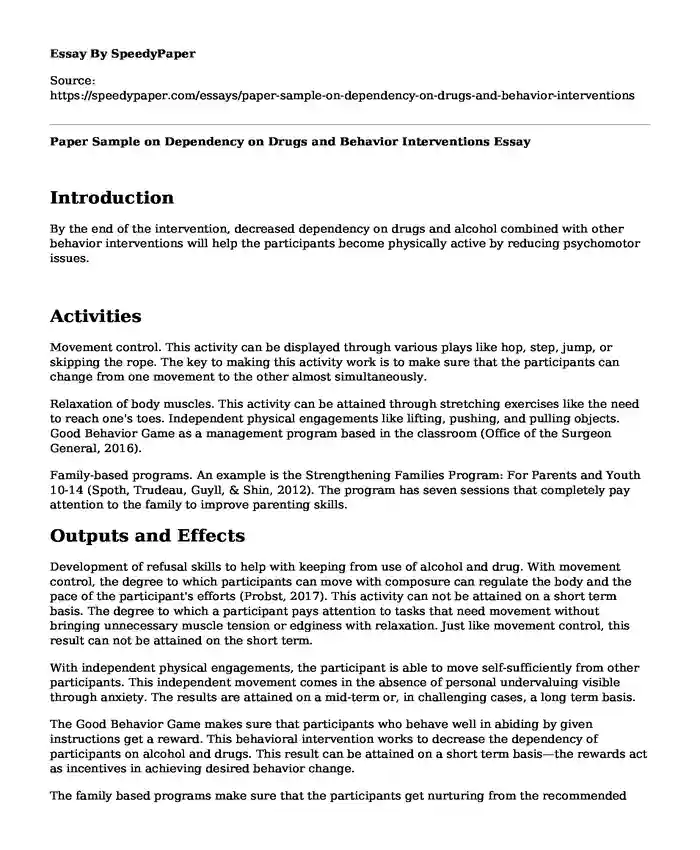
| Type of paper: | Essay |
| Categories: | Substance abuse Behavior change |
| Pages: | 3 |
| Wordcount: | 592 words |
Introduction
By the end of the intervention, decreased dependency on drugs and alcohol combined with other behavior interventions will help the participants become physically active by reducing psychomotor issues.
Activities
Movement control. This activity can be displayed through various plays like hop, step, jump, or skipping the rope. The key to making this activity work is to make sure that the participants can change from one movement to the other almost simultaneously.
Relaxation of body muscles. This activity can be attained through stretching exercises like the need to reach one's toes. Independent physical engagements like lifting, pushing, and pulling objects. Good Behavior Game as a management program based in the classroom (Office of the Surgeon General, 2016).
Family-based programs. An example is the Strengthening Families Program: For Parents and Youth 10-14 (Spoth, Trudeau, Guyll, & Shin, 2012). The program has seven sessions that completely pay attention to the family to improve parenting skills.
Outputs and Effects
Development of refusal skills to help with keeping from use of alcohol and drug. With movement control, the degree to which participants can move with composure can regulate the body and the pace of the participant's efforts (Probst, 2017). This activity can not be attained on a short term basis. The degree to which a participant pays attention to tasks that need movement without bringing unnecessary muscle tension or edginess with relaxation. Just like movement control, this result can not be attained on the short term.
With independent physical engagements, the participant is able to move self-sufficiently from other participants. This independent movement comes in the absence of personal undervaluing visible through anxiety. The results are attained on a mid-term or, in challenging cases, a long term basis.
The Good Behavior Game makes sure that participants who behave well in abiding by given instructions get a reward. This behavioral intervention works to decrease the dependency of participants on alcohol and drugs. This result can be attained on a short term basis—the rewards act as incentives in achieving desired behavior change.
The family based programs make sure that the participants get nurturing from the recommended parenting skills. The participants exist in an environment where limits are in place, efficient communication, and refusal skills. This result is evident solely on a long term basis because there is a need for adequate conditioning.
Conclusion
The program's context involves participants affected by three distinct variables, psychomotor issues, dependency on drugs and alcohol, and physical activity. The psychomotor problems are the dependent variables. The psychomotor issues, as exhibited by the participants, rely on the level of physical activity and the ability to live without reliance on alcohol and drug use. As such, physical activity and the dependence on alcohol and drug use are independent variables. The program setting involves the participants as well as considerable input from their families. As such, for the program to attain its objective, then the participants' families need to be ready to participate. The families of the participants have a part to play in fulfilling the family-based behavioral interventions.
References
Facing Addiction in America: The Surgeon General's Report on Alcohol, Drugs, and Health. (2016). PubMed. https://pubmed.ncbi.nlm.nih.gov/28252892/
Probst, M. (2017). Psychomotor Therapy for Patients with Severe Mental Health Disorders. Occupational Therapy - Occupation Focused Holistic Practice in Rehabilitation.
https://doi.org/ 10.5772/intechopen.68315
Spoth, R. L., Trudeau, L. S., Guyll, M., & Shin, C. (2012). Benefits of Universal Intervention Effects on a Youth Protective Shield 10 Years after Baseline. Journal of Adolescent Health, 50(4), 414-417.
https://doi.org/10.1016/j.jadohealth.2011.06.010.
Cite this page
Paper Sample on Dependency on Drugs and Behavior Interventions. (2024, Jan 11). Retrieved from https://speedypaper.net/essays/paper-sample-on-dependency-on-drugs-and-behavior-interventions
Request Removal
If you are the original author of this essay and no longer wish to have it published on the SpeedyPaper website, please click below to request its removal:
- Free Essay - Criminal Punishment for Adolescent Cyberbullying
- Essay Sample: Methods to Fight the Jim Crow Laws
- Essay Sample Discussing Racial Bias in the Judicial Process
- Essay Example on Workplace Violence and Harassment Program
- Paper Essay on Gender Gap: How It Ties to Racism in the Workplace
- Paper Example - Intersectionality and Women's Leadership
- Free Essay Example: Organizational Problem Analysis
Popular categories




